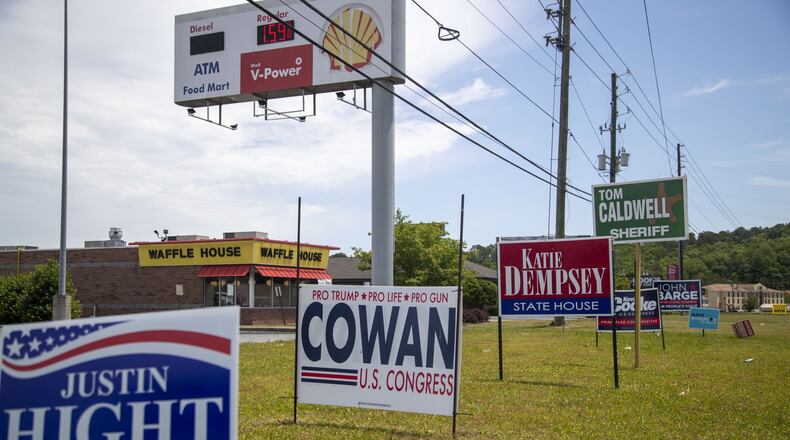About Georgia's 14th Congressional District: It covers the northwest corner of Georgia, taking in the city of Rome and including Gordon, Paulding and Polk counties. It was created after the 2010 census awarded Georgia another congressional district to accommodate its growth in population. After Republican U.S. Rep. Tom Graves, who has been the district's only representative in the U.S. House, announced he would not seek re-election, nine candidates qualified for the GOP primary.
Republican candidates in Georgia’s 14th Congressional District face a crowded primary, and candidates hope to distinguish themselves from each other while still upholding conservative values they say many voters want.
“I think people know by now, whoever they vote for out of our nine candidates, you’re going to get someone who supports the president, who supports the Second Amendment and doesn’t want to vote for these red-flag laws and they’re all going to say they’re pro-life,” Floyd County GOP Chairman Luke Martin said.
The 14th District is about 86% white and is considered a Republican stronghold. It encompasses much of northwest Georgia, including the city of Rome and Gordon, Paulding and Polk counties.
>>Related: Where 14th District Republican candidates stand on the issues
>>Related: Republicans aim to hang onto Georgia's 7th Congressional District seat
>>Related: Democratics line up to flip Georgia's 7th Congressional District
U.S. Rep Tom Graves, a Republican from Ranger, is the only congressman ever to serve in the 14th District after it was created following the 2010 census. He caught many political observers by surprise when he announced he would not seek re-election.
A rush of candidates then qualified to fill his spot. High-profile contenders include construction executive Marjorie Taylor Greene, who boasts prominent endorsements and large sums of cash on hand; neurosurgeon John Cowan, who trails Greene only slightly in fundraising; and former Georgia School Superintendent John Barge.
Also in the race is prosecutor Clayton Fuller, who has largely self-financed his own campaign while he is deployed with the Georgia Air National Guard responding to the pandemic. He reported about $150,000 in his account in his latest disclosure, and he's launched TV ads showing off his pugilistic side.
The winner of the June GOP primary will face off against Democrat Kevin Van Ausdal in November’s general election.
Bruce Collier, a 71-year-old retiree from Dallas, says his priority is to elect someone who is“extremely to the right and conservative.”
Graves, who won the district with 76.5% of the vote in 2018, fit the bill as a conservative. His lifetime rating from the American Conservative Union is in the upper tier in the state’s congressional delegation at 94.10.
Collier also wants someone who has strong Christian values and “is anti-abortion and just lines up with (President Donald) Trump’s way of thinking.”
Health care and the COVID-19 response are also shaping up to be strong issues in the election. That’s benefited Cowan, who has the support of nurse Erin Riley.
“We have to open things back up,” she said. “And we can’t have socialized medicine.”
Health care concerns in the district also include insurance coverage. About 14% of its population lacks health insurance, slightly better than Georgia’s overall average of 15.7%. The national average is 10%.
Many of the district’s voters also say candidates need some business experience.
“That’s where Trump came from,” Collier said.
Jason Holliday, a 36-year-old business owner, also values candidates who have owned companies.
“If you’ve never run a business, how can you tell businesses how to run their business?” he said.
Holliday is supporting Greene.
She is one of two candidates who — after Graves’ surprise announcement to exit Congress — jumped into the 14th District race after first campaigning in another district. The other is Ben Bullock.
Greene originally ran in the 6th Congressional District, and her campaign says she is now living within the 14th District.
Bullock first campaigned in the 7th Congressional District race and says he has now relocated to Paulding County.
“A big issue that’s been made in the campaign is do you want somebody from here or somebody from outside?” said Martin, the Floyd County GOP chairman.
But some, Martin said, question how important it is that candidates live in the district because the 2020 census has the potential to redraw the 14th’s boundaries.
Martin said where a candidate is from has been one of the few ways to separate the contenders, whom he described as relatively indistinguishable otherwise.
“Even their ads are pro-Trump, pro-life, pro-gun,” he said.
Many of those issues are still a priority to voters in the district.
“I never considered myself either a Republican or a Democrat until lately, mainly because I’m a big hunter,” Holliday said. “And I believe people should work, that’s my main thing. I’ve worked my whole dang life and I didn’t have nothing growing up, so everything I got I worked for. I think it should be the same way for most people.”
The COVID-19 pandemic threw a wrench in how many of the candidates campaign. They now have to do it virtually rather than in person. But it’s also opened the door to a more direct line of communication between candidates and constituents.
Martin expects the connection to last beyond the pandemic and affect campaigning in the district in the future.
“I think the public is starting to expect this,” he said.
The new strategy has also allowed candidates to better connect with younger voters, Martin said.
“Historically, the party has been older. But as far as who’s been active on social media, it’s a lot younger,” he said. “We’ve got to find a way to keep them engaged. And it might be that they’re more comfortable doing that on social media.”
About the Author
Keep Reading
The Latest
Featured



